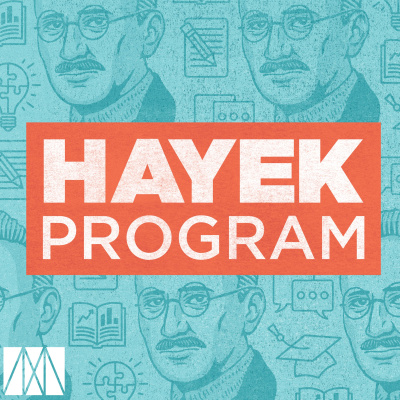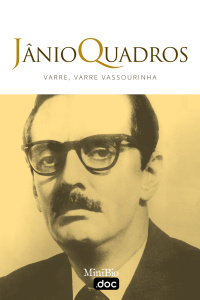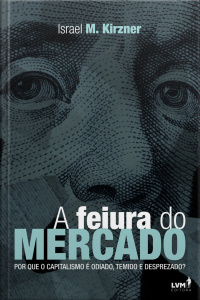Synopsis
The Hayek Program Podcast includes audio from lectures, interviews, and discussions of scholars and visitors from the F. A. Hayek Program for Advanced Study in Philosophy, Politics, and Economics at the Mercatus Center at George Mason University. The F. A. Hayek Program is devoted to the promotion of teaching and research on the institutional arrangements that are suitable for the support of free and prosperous societies. Implicit in this statement is the presumption that those arrangements are to some extent open to conscious selection, as well as the appreciation that the type of arrangements that are selected within a society can influence significantly the economic, political, and moral character of that society.
Episodes
-
Austrian Economics & Applied Political Economy— Peter Boettke & Adam Martin
05/10/2022 Duration: 01h06minOn this episode of the Hayek Program Podcast, Peter Boettke & Adam Martin share a conversation on Martin's work in the field of Austrian economics and applied political economy. Martin first shares how he first became interested in economics at the University of Dallas before moving on to King's College London and New York University. Later, he shares his concept of "degenerate cosmopolitanism" and how it relates to current discussions surrounding egalitarianism. We'll also hear how his own research in Austrian economics has shaped his thinking in recent times and why he recommends that every economist looks to Charles Jones for a primer on the facts of economic growth.If you like the show, please leave a 5-star review for us on Apple Podcasts and tell others about the show! We're available on Apple Podcasts, Spotify, Amazon Music, and wherever else you get your podcasts.Do you have a question related to the podcast or maybe a show topic you'd like to suggest? Write to us at hayekprogram@mercatus.gmu
-
Best of the Podcast! — Peter Boettke & Bobbi Herzberg Remember Elinor Ostrom
21/09/2022 Duration: 50minOn this episode of the Hayek Program Podcast, we revisit a conversation from the Hayek Program Podcast with Peter Boettke & Bobbi Herzberg as they recount their histories with Elinor Ostrom. They explore Herzberg's time learning from and working with the Ostroms. Herzberg explains how the Ostroms shaped her conception of political economy and demonstrated to her how to be intellectually curious and a lifelong learner. Herzberg also recounts her time as department chair, including the lessons she learned in balancing research and leadership in academia.If you like the show, please leave a 5-star review for us on Apple Podcasts and tell others about the show! We're available on Apple Podcasts, Spotify, Amazon Music, and wherever else you get your podcasts.Do you have a question related to the podcast or maybe a show topic you'd like to suggest? Write to us at hayekprogram@mercatus.gmu.edu with your questions and suggestions.Follow the Hayek Program on Twitter: @HayekProgramLearn more about Academic &
-
Israel Kirzner on His Career as an Austrian Economist
07/09/2022 Duration: 01h03minOn this episode of the Hayek Program Podcast, we'll listen to an archived episode, featuring Israel Kirzner, discussing his career as an Austrian economist. Kirzner shares how he started his studies from an accounting focus, having never heard of Austrian economics, until a chance class with Ludwig von Mises changed the course of his career. He goes on to explore the process by which Austrian economics has developed over the years and explains the one insight from Mises it took him 10 years to fully understand. Join us for this exciting trip down memory lane as we hear from one of the key thinkers in Austrian economics!If you like the show, please leave a 5-star review for us on Apple Podcasts and tell others about the show! We're available on Apple Podcasts, Spotify, Amazon Music, and wherever else you get your podcasts.Do you have a question related to the podcast or maybe a show topic you'd like to suggest? Write to us at hayekprogram@mercatus.gmu.edu with your questions and suggestions.Follow the Hay
-
"Jan Tinbergen (1903-1994) and the Rise of Economic Expertise" Book Panel
26/08/2022 Duration: 01h22minOn this episode of the Hayek Program Podcast, we'll hear a book panel discussion of Erwin Dekker's book, Jan Tinbergen (1903-1994) and the Rise of Economic Expertise. In it, Dekker argues that Tinbergen's crucial contribution is the theory of economic policy and the legitimation of economic expertise in service of the state. It traces his youthful socialist ideals which found political direction in the Plan-socialist movement of the 1930s for which he developed new economic models to combat the Great Depression. The book then turns to an examination of his attempt to repeat this achievement in the development projects in the Global South and at the international level for the United Nations. Peter Boettke moderates the book panel, with contributions from panelists: Sandra Peart, Dean of the Jepson School of Leadership Studies at the University of RichmondMichele Alacevich, Associate Professor of Economic History and the History of Economic Thought at Bologna UniversityIf you like the show, please leave a 5-
-
Liberalism for All — Is Social Justice a Mirage?
10/08/2022 Duration: 01h13minOn this episode of the Hayek Program Podcast, we conclude our summer series of the podcast on Liberalism for All, hosted by Jayme Lemke as she explores the underpinnings and outworkings of a free and open society. Driving the discussion is a set of core questions, including:What does it mean to be liberal in the 21st century?What is the relationship between liberalism and equality?Is the pursuit of equality a threat or opportunity for the liberal project?Joining Lemke for this episode is Stefanie Haeffele, Senior Program and Operations Director of Mercatus Academic & Student Programs and Senior Fellow with the F. A. Hayek Program. Lemke and Haeffele begin their conversation by considering how social justice is often thought of in modern terms before examining why Hayek saw a tension between liberalism and the pursuit of social justice. Haeffele then offers her thoughts on the tradeoff between liberty and social justice before moving the conversation to a discussion regarding the analogy of institutiona
-
Liberalism for All — Liberalism and Social Justice
27/07/2022 Duration: 01h12minOn this episode of the Hayek Program Podcast, we continue a special summer series of the podcast on Liberalism for All, hosted by Jayme Lemke as she explores the underpinnings and outworkings of a free and open society. Driving the discussion is a set of core questions, including:What does it mean to be liberal in the 21st century?What is the relationship between liberalism and equality?Is the pursuit of equality a threat or opportunity for the liberal project?Joining Lemke for this episode is Nick Cowen, Senior Lecturer at the University of Lincoln. In Cowen's recent book, Neoliberal Social Justice, he asks which policies can limit arbitrary socio-economic inequalities, a point Lemke examines further as they discuss what makes an inequality arbitrary. Later in the conversation, Cowen expounds upon the idea of property-owning democracy and why it is not as different from welfare state capitalism as some proponents would argue. Additionally, throughout their dialogue, Cowen and Lemke consider whether the q
-
Liberalism for All — The Political Economy of Equality
13/07/2022 Duration: 01h01minOn this episode of the Hayek Program Podcast, we continue a special summer series of the podcast on Liberalism for All, hosted by Jayme Lemke as she explores the underpinnings and outworkings of a free and open society. Driving the discussion is a set of core questions, including:What does it mean to be liberal in the 21st century?What is the relationship between liberalism and equality?Is the pursuit of equality a threat or opportunity for the liberal project?Joining Lemke for this episode is John Meadowcroft, a Reader in Public Policy at King's College London, as they discuss James Buchanan's work on a political economy of equals. Meadowcroft lays out his analysis of "consensual politics" and explains why true moral equality means that "everyone counts for one." He also explains why Buchanan believed the constitutional mentality begins with moral equality and examines Buchanan's proposal for unanimous consent in politics. As they conclude their discussion, Lemke and Meadowcroft consider those disadvanta
-
Liberalism for All — The Political Economy of Inequality
29/06/2022 Duration: 01h11minOn this episode of the Hayek Program Podcast, we continue a special summer series of the podcast on Liberalism for All, hosted by Jayme Lemke as she explores the underpinnings and outworkings of a free and open society. Driving the discussion is a set of core questions, including:What does it mean to be liberal in the 21st century?What is the relationship between liberalism and equality?Is the pursuit of equality a threat or opportunity for the liberal project?Joining Lemke for this episode is Mikayla Novak, a doctoral candidate in sociology at The Australian National University and former economist with her PhD in economics from RMIT University. Lemke and Novak begin their conversation by asking how liberalism connects to the question of inequality and the extent to which someone with liberal convictions should be concerned about inequality. Building on this, Novak explores how social exclusion and biases contribute to inequality and how she managed to include an analysis of these phenomena in her work. A
-
Liberalism for All — The Regressive Effects of Regulation
15/06/2022 Duration: 59minOn this episode of the Hayek Program Podcast, we continue a special summer series of the podcast on Liberalism for All, hosted by Jayme Lemke as she explores the underpinnings and outworkings of a free and open society. Driving the discussion is a set of core questions, including:What does it mean to be liberal in the 21st century?What is the relationship between liberalism and equality?Is the pursuit of equality a threat or opportunity for the liberal project?Joining Lemke for this episode is Diana Thomas, associate professor of economics at Creighton University and an alum of the Mercatus PhD Fellowship. Thomas begins by detailing what regressive effects are, followed by the manners in which regulations, even those with the best of intentions, tend to create such effects. Additionally, she tackles the issue of public risk reduction strategies, and how these can often end up crowding out private risk reduction strategies. As part of the conversation, Lemke and Thomas both discuss the push for equality, an
-
Liberalism for All — The War on Drugs
01/06/2022 Duration: 01h19minOn this episode of the Hayek Program Podcast, we begin a special summer series of the podcast on Liberalism for All, hosted by Jayme Lemke as she explores the underpinnings and outworkings of a free and open society. Driving the discussion is a set of core questions, including:What does it mean to be liberal in the 21st century?What is the relationship between liberalism and equality?Is the pursuit of equality a threat or opportunity for the liberal project?Joining Lemke for this episode is Audrey Redford, assistant professor of economics at Western Carolina University and an alum of the Adam Smith Fellowship. Redford shares her journey in becoming a political economist before explaining her concept of 'malnovation' in illicit drug markets and how it shapes the efforts of individuals to acquire illicit drugs. They also discuss what low-hanging fruit exists for drug policy reform, and what a more liberal approach to public drug policy would look like. As they close their conversation, Lemke and Redford share
-
Wrestling with Economic Development — Peter Boettke & Shruti Rajagopalan
18/05/2022 Duration: 01h05minOn this episode of the Hayek Program Podcast, Peter Boettke & Shruti Rajagopalan tackle several different puzzles in economic development, influenced by Shruti's work on law and economics in India. Rajagopalan shares her insights from her work in studying constitutional political economy in India and shares the most important lesson she has learned about economic development. Additionally, she addresses the biggest challenges she sees to liberalism in the world today and shares her thoughts on the current state of political economy in India.If you like the show, be sure to leave a 5-star review for us on Apple Podcasts and tell others about the show! We're available on Apple Podcasts, Spotify, Amazon Music, and wherever else you get your podcasts.Follow the Hayek Program on Twitter: @HayekProgramLearn more about Academic & Student ProgramsFollow the Mercatus Center on Twitter: @mercatusCC Music: Twisterium
-
Immigration and Freedom Book Panel
05/05/2022 Duration: 01h33minOn this episode of the Hayek Program Podcast, we'll hear a book panel discussion of Chandran Kukathas's book, Immigration and Freedom. Immigration is often seen as a danger to western liberal democracies because it threatens to undermine their fundamental values, most notably freedom and national self-determination. In this book, however, Chandran Kukathas argues that the greater threat comes not from immigration but from immigration control. The discussion is moderated by Stefanie Haeffele, and Kukathas is joined by panelists:Ryan Muldoon — Director of Undergraduate Studies; Associate Professor of Philosophy, University at BuffaloLiza Schuster — Reader in Sociology, City Univeristy of LondonBas van der Vossen — Associate Professor of Philosophy; Director, Law and the Liberal Arts Minor, Chapman University
-
Why It's Ok to Eat Meat—Jordan Lofthouse & Dan Shahar
21/04/2022 Duration: 53minOn this episode of the Hayek Program Podcast, Jordan Lofthouse and Dan Shahar discuss Shahar's latest book, Why It's Ok to Eat Meat. Many people say that eating meat is morally wrong and we shouldn’t eat it. This book pushes back against the many arguments that eating meat is immoral or unethical in a respectful and engaging manner. Shahar argues that the appropriate response to the fact that many of the things we consume, like meat, are associated with problems is “to devote ourselves to action—for most of us, far more action than we’re accustomed to taking."
-
The Science and Art of Economics with Peter Boettke & Rosolino Candela, Pt. 2
06/04/2022 Duration: 44minIn this episode of the Hayek Program Podcast, we'll hear part two of a conversation between Peter Boettke & Rosolino Candela on the science and art of economics. Candela expands upon his vision of property rights and makes his case for why property rights are fundamentally human rights. Additionally, the pair discuss the intellectual direction taken by the mainstream of the economics profession, and Candela offers his take on why challenges to liberalism persist in the modern day.
-
The Science and Art of Economics with Peter Boettke & Rosolino Candela, Pt. 1
23/03/2022 Duration: 38minIn this episode of the Hayek Program Podcast, we'll hear part one of a conversation between Peter Boettke & Rosolino Candela on the science and art of economics. Candela draws on his experience from growing up in an immigrant family to discuss how it shaped his views on cultural integration in economics. He goes on to explore why he believes commerce creates peaceful, social interaction and how New York's cosmopolitan nature reinforced this view in his youth.
-
Peter Boettke and Daniel Smith Q&A on Money and The Rule of Law
09/03/2022 Duration: 51minOn this episode of the Hayek Program Podcast, Peter Boettke and Daniel Smith answer audience questions about their book, Money and the Rule of Law. Boettke and Smith address the issue of special interest groups in the formation of monetary policy and offer their thoughts on the possibility of a resurgence of interest in Austrian macroeconomics as they work through the questions. Listen in to see if your question was answered!
-
No Free Lunch — Confronting Economic Fallacies with Peter Boettke & Caleb Fuller
23/02/2022 Duration: 01h15minOn this episode of the Hayek Program Podcast, Peter Boettke & Caleb Fuller embark on a tour of the many fallacies in economics as they discuss Fuller's latest book, "No Free Lunch: Six Economic Lies You've Been Taught And Probably Believe." Through an engaging conversation, Boettke & Fuller share how economics is about people, how they pursue their dreams, and what hinders them along the way. They address the ways in which economics is commonly misused in popular culture and offer a lens through which to view economic challenges in light of their impact on the whole of human society. CC Music: Twisterium
-
"Manufacturing Militarism" Book Panel
09/02/2022 Duration: 01h06minOn this episode of the Hayek Program Podcast, we'll hear a book panel discussion of "Manufacturing Militarism: U.S. Government Propaganda in the War on Terror," written by Christopher J. Coyne & Abigail R. Hall. Applying a political-economic approach to the incentives created by a democratic system with a massive national security state, Coyne and Hall delve into case studies from the War on Terror to show how propaganda operates in a democracy. Peter Boettke moderates the panel, which is joined by two commentators — Randall G. Holcombe, DeVoe Moore Professor of Economics at Florida State University, and Risa Brooks, Allis Chalmers Associate Professor of Political Science at Marquette University.
-
Towards an Economics of Natural Equals, Pt. 2 — Peter Boettke, David Levy, & Sandra Peart
26/01/2022 Duration: 43minOn this episode of the Hayek Program Podcast, we'll hear part two of Peter Boettke's interview with David Levy and Sandra Peart on their latest book, "Towards an Economics of Natural Equals." As they conclude their interview, Levy and Peart discuss the issue of replication in archival research and how their scholarship is disciplined to avoid the pitfalls associated with it. They also address whether or not we can judge those in the past by normative standards we adopt today, rather than by what they were working with in their own time, and they consider how responsible a scholar is for the use of their ideas once they produce them. CC Music: Twisterium
-
Towards an Economics of Natural Equals, Pt. 1 — Peter Boettke, David Levy, & Sandra Peart
12/01/2022 Duration: 48minOn this episode of the Hayek Program Podcast, we'll hear part one of Peter Boettke's interview with David Levy and Sandra Peart on their latest book, "Towards an Economics of Natural Equals." In it, Levy and Peart engage with how the Virginia School's economics of natural equals makes consent critical for policy. The trio addresses the lasting legacy of the Virginia School of Political Economy, asking how economics can recover its political economy roots and prioritize the discussion that makes intelligence in democratic action possible. In addition, they investigate the two ways of doing economics described by James Buchanan and examine the influence of Frank Knight on the Virginia School. CC Music: Twisterium.















